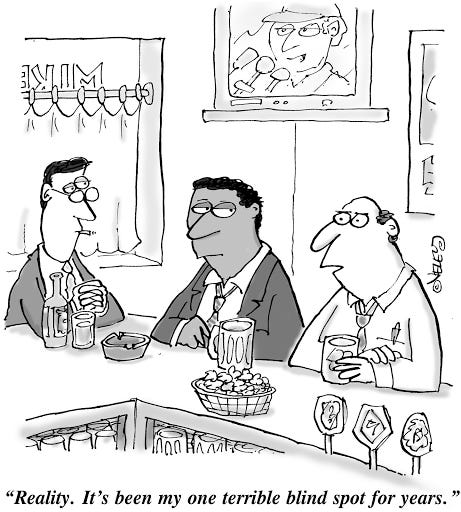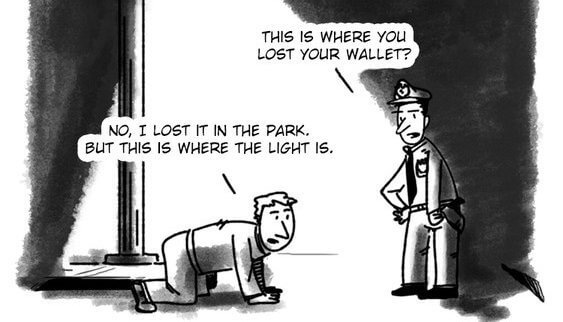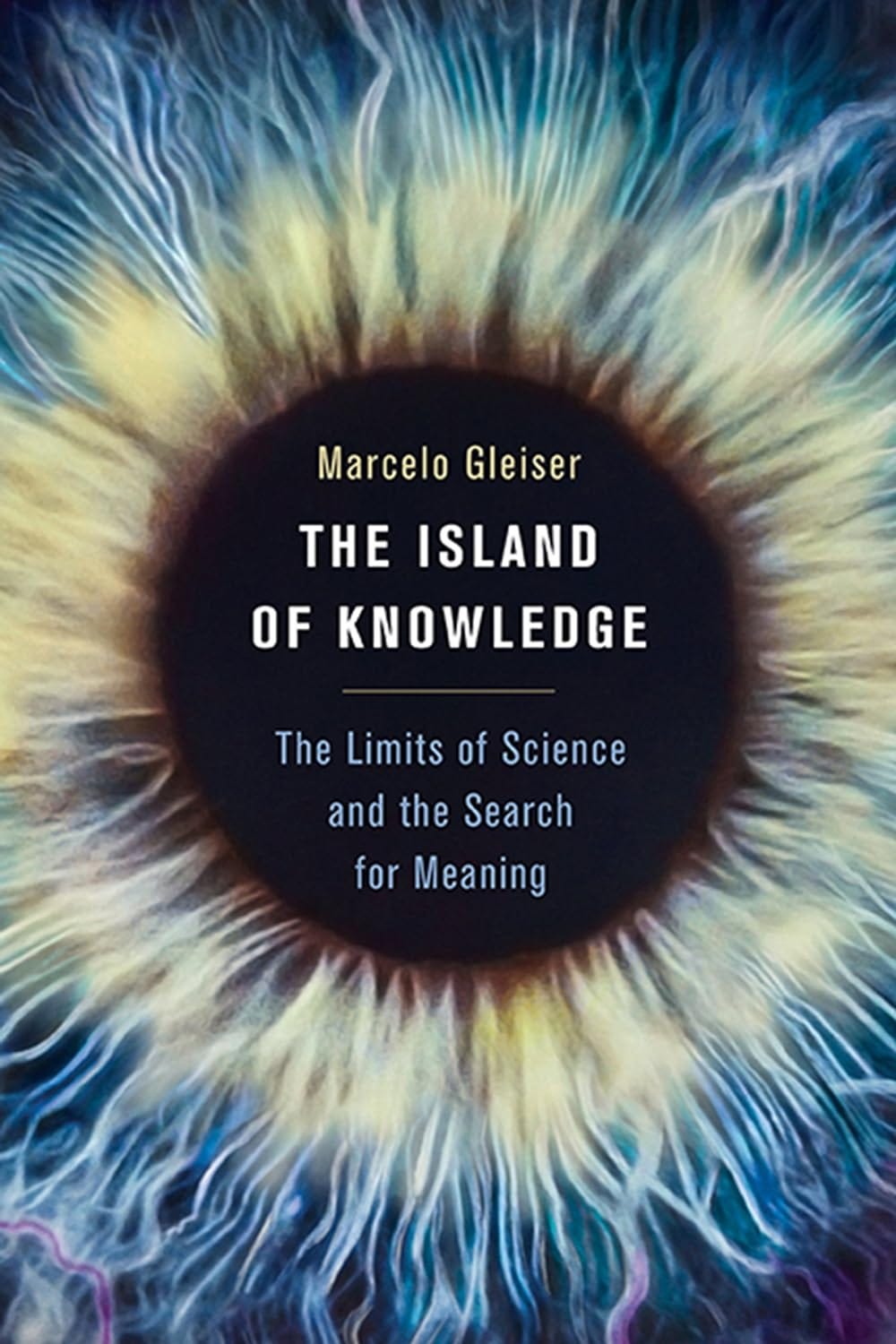I Spent 200+ Hours Collecting The Top 35 Resources On Perspectiving So You Become An Idea Machine
Over my last two posts, I’ve introduced how Perspectiving can help you notice things that others don’t. This is important because if you can see things and perspectives others can’t, you can create rare and valuable ideas.
This skill is critical because standing out is the essential prerequisite for success in a world that looks like this…
Once we understand the value of it, the question becomes…
How do we deliberately improve at Perspectiving?
For me, the answer has been collecting lots of Perspectives and then extracting broader insights from each perspective over 200+ hours over the years. This research has had a major impact on my thought leadership.
In this article, I condense all of that research into…
The top 35 images/videos on Perspectiving that have had the most profound impact on me.
My top 8 Principles on Perspectiving that help me see perspectives others don’t off the top of my head.
My top insights on how to use the broader insights to become a better thought leader.
Bottom line: By becoming good at Perspectiving, you can rise above the noise of the internet. More specifically, you can move beyond creating content that uses the same templates as everyone else.
With that, I introduce you to…
Michael’s 8 Principles Of Perspectiving
The following 8 principles form the foundation of my worldview:
We look at reality through a straw. (free subscribers)
We live on a cosmological island. (free subscribers)
Reality is more bizarre than we realize.
Our unique perspective can be valuable to others if we take these four steps.
We experience reality through at least 7 filters.
All perspectives are relative.
Each of our senses is limited to a tiny part of that sense’s possibility.
Reality is inside of us so we should understand how it gets created.
Free subscribers get the first two principles for free. Paid subscribers get the other six principles. These extra seven principles include an additional 4,000 words and 35 images/charts/videos that have changed my life. And they provide a more complete understanding of Perspectiving that took me years to learn and then apply to my thought leadership.
One Last Thing: How To Read This Article
I recommend viewing this article as a reference article you can keep coming back to and reflecting on. With all of the TED Talks and other videos, it would take you 2+ hours to go through everything.
While most articles on the Internet hit on one main point, this article is unique in that it weaves together many complex ideas so you can see how everything fits together in one place. In my experience as a learner, when you see how things connect, it’s much easier to remember and use them all. Furthermore, in my experience trying to learn on the Internet, so much of what is shared with us in the context of a newsfeed is fragmented and disconnected, which makes it overwhelming.
#1. We Look At Reality Through A Straw
If large portions of the world remain unseen or inaccessible to us, we must consider the meaning of the word ‘reality’ with great care.
—Marcelo Gleiser, author of The Island of Knowledge
Our perspective feels complete. For example, when we open our eyes and look out at the world, it feels like we’re looking at all of reality even though we’re actually looking at reality through a metaphorical straw. Stated differently, it’s like we’re a cocky ant in the night with a flashlight who thinks its brain and senses can experience everything.
Just as an ant couldn’t imagine a human mind, as a human it is impossible to imagine what reality would feel like if we could:
Experience every sense possible to the finest degree
Experience all of the branching parallel universes simultaneously
Have a 1B IQ
Hold all of reality in our working memory simultaneously
In reality…
What we can’t experience is invisible. Therefore, it’s easy to diminish its importance.
We can only see a small sliver of things, but that feels like everything to us.
Or as cognitive psychologist Donald Hoffman says:
Perception is not a window on objective reality. It is an interface that hides objective reality behind a veil of helpful icons.
—Donald Hoffman, The Case Against Reality: Why Evolution Hid the Truth from Our Eyes
This psychological bias of looking at a situation and thinking we see everything when we only see a sliver has a name—the Streetlight Effect, and it’s best illustrated with this cartoon:
Takeaway
It’s worth going into reality with humility and curiosity:
Humility: What we experience in any situation is one trillionth of what could be experienced.
Curiosity: We can understand much more than we currently do as individuals and as a species with the right effort.
The following Isaac Newton quote demonstrates a powerful stance toward reality…
I do not know what I may appear to the world, but to myself I seem to have been only like a boy playing on the sea-shore, and diverting myself in now and then finding a smoother pebble or a prettier shell than ordinary, whilst the great ocean of truth lay all undiscovered before me.
—Isaac Newton
Einstein had a similar stance:
What I see in Nature is a magnificent structure that we can comprehend only very imperfectly, and that must fill a thinking person with a feeling of humility.
—Albert Einstein
Dive Deeper
Donald Hoffman is an evolutionary biologist whose 22-minute TED Talk blew my mind when I first watched it. It changed how I see reality.
#2. We Live On A Cosmological Island
Expanding on Newton’s metaphor of being a child on a seashore, in many ways, we live on a cosmological island. Everything on the island is normal to us. The water around the island represents the goldilocks zone of what we can observe and what we can learn about. Things operate differently in water than they do on land. Thus, the phenomenon of the water appears bizarre to us. Everything past the horizon represents what we “don’t know we don’t know.”
As we grow as individuals and as a civilization, the shoreline grows.
The larger the island of knowledge, the longer the shoreline of wonder.
—Huston Smith
On the other hand, the fact that we are still on a tiny island relative to what is unknown remains the same and will remain the same. For example, we have no idea what came before the big bang and no foreseeable way of finding out. Our observable universe is expanding faster than the speed of light, which means there are large parts of the universe where the light will never reach us.
Despite all of humanity’s great inventions, we have more in common with our ancestors than we might think. Looking from outside-in, we are a tiny speck of all of reality. Looking inside-out, we are Gods because we create our all-encompassing reality.
Takeaway
Thought leaders embark on the “Hero’s Journey” to bravely explore the unknown ocean in order to discover new knowledge and bring it back to others.

This famous clip from Disney’s Moana brilliantly captures this mythical journey…
Each sentence in the song is pregnant with meaning that builds upon the island metaphor:
I've been staring at the edge of the water
Long as I can remember, never really knowing why
I wish I could be the perfect daughter
But I come back to the water, no matter how hard I tryEvery turn I take, every trail I track
Every path I make, every road leads back
To the place I know, where I can not go
Though I long to beSee the line where the sky meets the sea? it calls me
And no one knows how far it goes
If the wind in my sail on the sea stays behind me
One day I'll know
If I go, there's just no telling how far I'll goI know everybody on this island
Seems so happy on this island
Everything is by design
I know everybody on this island
Has a role on this island
So maybe I can roll with mineI can lead with pride, I can make us strong
I'll be satisfied if I play along
But the voice inside sings a different song
What is wrong with me?See the light as it shines on the sea, it's blinding
But no one knows how deep it goes
And it seems like it's calling out to me, so come find me
And let me know what's beyond that line
Will I cross that line?See the line where the sky meets the sea, it calls me
And no one knows how far it goes
If the wind in my sail on the sea stays behind me
One day I'll know how far I'll go
Personal Resonance
The island metaphor has helped me feel into my own place in the cosmos. It connects me to all of humanity who have shared the same human condition throughout all of time. It expresses the contradicting feelings of wonder, awe, curiosity, possibility vs limits, smallness vs infinitude, and connection vs aloneness.
Deep Dive
I was first exposed to the metaphor of an island as a way of understanding the limits of science in Dartmouth professor Marcelo Gleiser’s book, The Island Of Knowledge:
You can get an abbreviated version of the book’s main ideas in Marcelo’s Google Talk:





